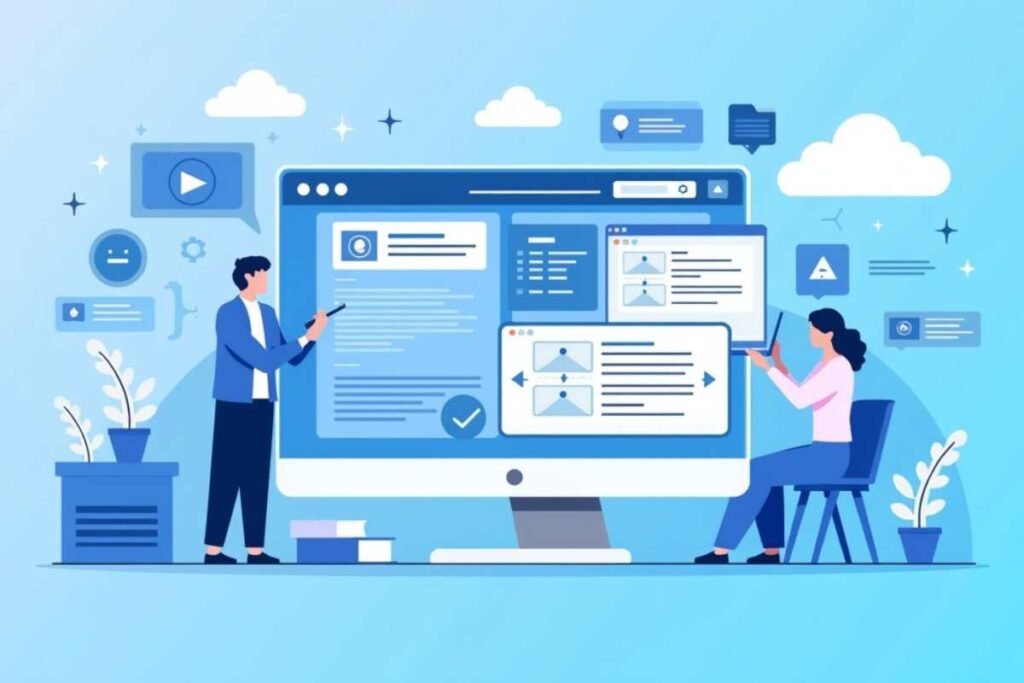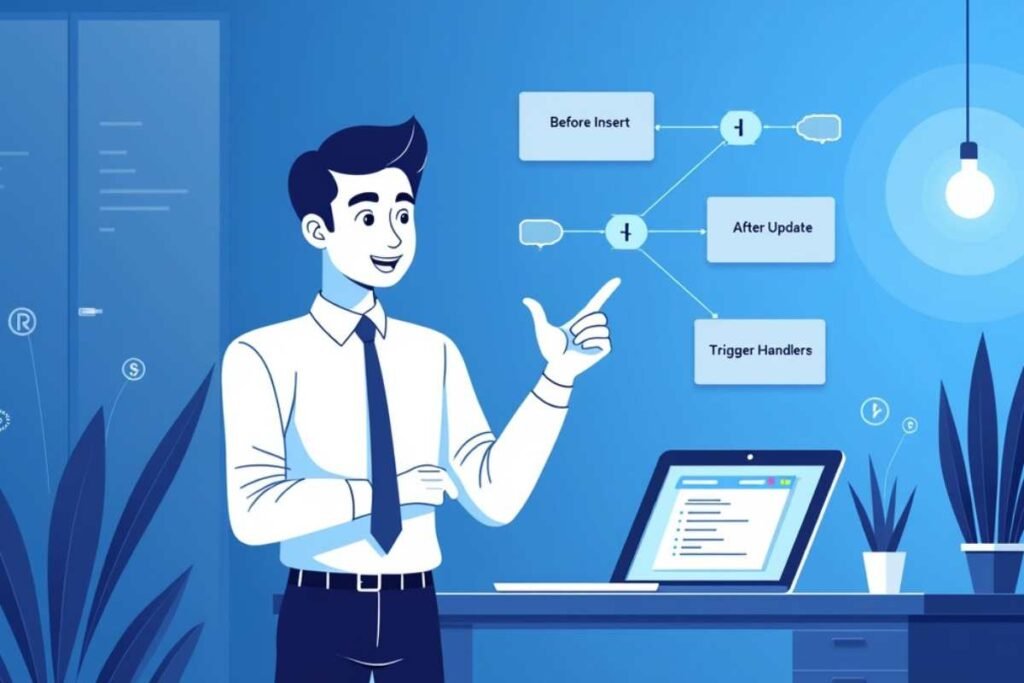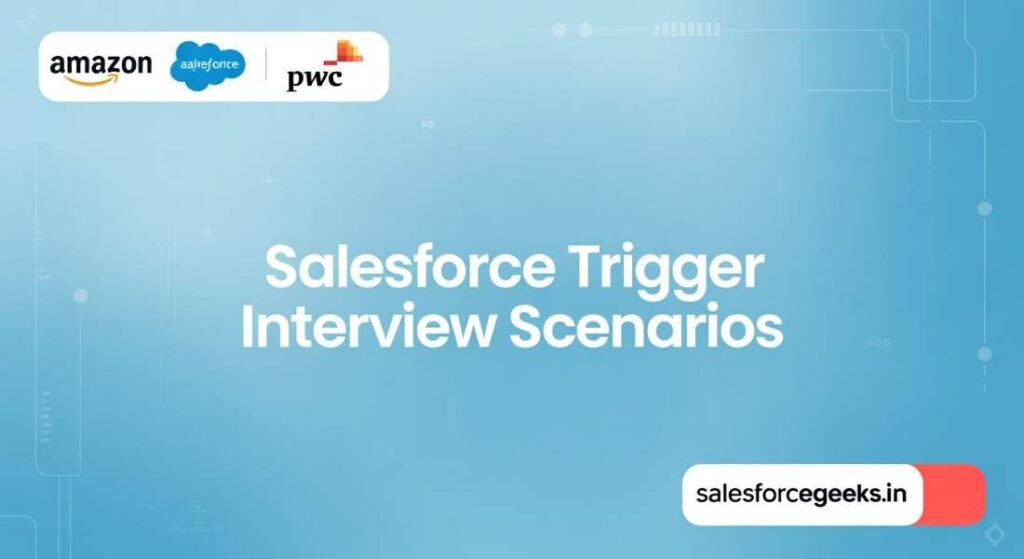When preparing for a Salesforce developer interview one of the most commonly asked topics is Salesforce trigger interview questions. Salesforce triggers form the backbone of business automation in the Salesforce ecosystem, making them a vital skill for developers. These questions test both your understanding of Apex coding and your ability to solve real-world scenarios efficiently.
In this complete guide, we’ll explore the most important Salesforce trigger interview questions their detailed answers, and strategies to handle coding challenges with confidence. Whether you are a beginner or an experienced professional this guide will help you master triggers and succeed in your next interview.
Understanding Salesforce Triggers

Before diving into Salesforce trigger interview questions its essential to understand what triggers are. A trigger in Salesforce is Apex code that executes automatically before or after certain data manipulation language DML events such as insert update delete or undelete.
For example when a new record is inserted a trigger can automatically validate data update related records or log actions. Salesforce triggers help automate repetitive tasks and ensure data consistency. This makes them a crucial feature in backend automation for every Salesforce developer.
Importance of Salesforce Triggers in Development
Salesforce triggers are not just a coding feature they represent a major shift in how developers handle automation and data integrity. When interviewers ask Salesforce trigger interview questions they assess your ability to implement business logic that ensures smooth record processing.
Triggers make it possible to:
- Validate data before saving.
- Update related objects automatically.
- Prevent deletion of critical data.
- Maintain referential integrity between parent and child records.
In interviews candidates who understand how to structure triggers efficiently stand out from others. Knowing the logic flow and performance best practices gives you an edge during Salesforce technical rounds.
Salesforce Trigger Basics Core Interview Questions
Interviewers often begin with basic Salesforce trigger interview questions to check your fundamental knowledge. For example you might be asked: What is a trigger?” or What are the types of triggers?
Triggers are categorized as before triggers and after triggers. “Before” triggers run before a record is committed to the database and are ideal for validation. “After” triggers run after the record is saved, suitable for updating related objects.
Another common question is about trigger context variables like. These hold record data before and after DML operations. Understanding these basics is critical because most interview scenarios build upon these foundational concepts.
Advanced Salesforce Trigger Interview Questions
Once the basics are covered advanced Salesforce trigger interview questions explore your ability to handle complex operations. You might be asked how to write bulk safe triggers or how to avoid recursion.
In Salesforce bulkification ensures that your trigger can handle hundreds of records at once without hitting governor limits. You achieve this by avoiding SOQL queries or DML statements inside loops. Instead collect data in lists or maps and execute queries outside the loop.
To prevent recursion developers often use a static Boolean variable that tracks whether the trigger logic has already executed. These best practices ensure your trigger runs efficiently and passes technical evaluations during interviews.
Scenario Based Salesforce Trigger Questions Explained
Scenario based questions are common in interviews because they test problem solving skills. For instance, an interviewer might ask how to prevent duplicate records or auto create related opportunities.
You might be given a scenario like: When a new Account is created automatically create an Opportunity. The logic involves writing an after insert trigger on the Account object, creating a new Opportunity record with default fields and inserting it in bulk mode.
Similarly interviewers may ask how to prevent record deletion when certain conditions exist, such as preventing the deletion of a Contact with related Cases. Being able to explain your approach step by step is more important than just showing code.
Common Coding Scenarios and How to Solve Them?
Salesforce trigger interview questions frequently include coding challenges. For example you might be asked to update a parent Account when a child Contact changes. The correct approach is to use an after update trigger gather parent IDs perform a SOQL query to retrieve parent records and update them accordingly.
Another scenario involves preventing duplicate Contacts based on email. You would use a before insert trigger collect email addresses and query existing records to ensure uniqueness.
When answering such coding questions emphasize clean logic bulk safety and clear explanations. Interviewers value developers who can write optimized maintainable code that aligns with Salesforce best practices.
Step by Step Guide to Writing Efficient Salesforce Triggers

To impress interviewers you must know the steps to design an efficient trigger. First understand the business requirement clearly know what needs to happen before or after the DML event. Then define the trigger event type such as before insert before update or after delete.
Next, structure your logic using collections lists sets maps to handle bulk records. Always separate your logic from the trigger body by using a handler class. This keeps your trigger clean and modular. Finally test your trigger using Apex test classes to ensure 100% code coverage.
These practices show professionalism and readiness for enterprise-level Salesforce projects helping you answer even the toughest Salesforce trigger interview questions confidently.
How to Avoid Common Mistakes in Salesforce Trigger Development?
Many developers fail Salesforce trigger interview questions due to common mistakes. One major error is placing SOQL queries inside loops which causes governor limit issues. Another mistake is writing multiple triggers for the same object leading to unpredictable execution order.
To avoid this, always maintain a single trigger per object and delegate logic to handler classes. Use static variables to control recursion and perform all DML operations outside loops.
Understanding Salesforces order of execution is also vital validation rules workflows and triggers interact in a specific order. Knowing this helps you troubleshoot and build reliable automation Development Practices.
Why It Matters Salesforce Trigger Framework?
Modern Salesforce trigger interview questions often focus on frameworks. A trigger framework provides a structured approach to manage multiple triggers efficiently. It helps you avoid redundancy maintain clean code and implement bulk safe logic.
Common frameworks include the TriggerHandler pattern where each trigger delegates its logic to a handler class. This allows centralized control over before/after contexts recursion prevention and testing.
Explaining your experience with trigger frameworks in interviews demonstrates senior level understanding and real world experience a factor that can greatly improve your hiring chances.
How to Prepare for Salesforce Trigger Interview Questions?
Preparation is key to acing your interview. Start by reviewing Apex trigger syntax and practicing with Salesforce’s Developer Edition Org. Implement small projects like automating opportunity creation or updating parent fields to build confidence.
Revisit important context variables and practice writing test cases. Reading through official Salesforce documentation and Trailhead modules also helps reinforce concepts. Remember Salesforce trigger interview questions test not only your coding skills but also your problem solving approach and understanding of business logic.
Real World Trigger Scenarios Asked in Interviews
Interviewers often design questions based on real business challenges. You might be asked to restrict updates on Opportunities, prevent reverting to earlier stages, or log changes to a custom object.
For instance when an Opportunity stage changes to Closed Won you can automatically create a follow up Task using an after update trigger. Or when deleting Accounts with high revenue you can block deletion using a before delete trigger. Being able to explain the rationale not just the code shows your ability to translate business requirements into technical solutions a key quality employers seek.
How Salesforce Triggers Differ from Workflows and Flows?
This is one of the most commonly misunderstood topics in Salesforce trigger interview questions. Workflows and Flows are declarative tools that automate tasks without code, while triggers are programmatic and provide deeper control.
For example a workflow can update a field on the same record but a trigger can update related records perform calculations, or integrate with external systems. Understanding this difference helps you determine when to use each tool effectively a skill that interviewers highly value.
Expert Tips to Master Salesforce Triggers

To stand out during Salesforce trigger interview questions focus on optimization clarity and scalability. Always test your triggers with different data volumes to ensure they work under bulk load.
Maintain a clear naming convention for triggers and related handler classes. Document your code use version control and follow Salesforce best practices. Understanding governor limits deeply will help you explain performance considerations effectively. Lastly practice explaining complex trigger logic in simple terms clarity is often more valuable than deep technical jargon during interviews Technorozen Resources.
Conclusion
Mastering Salesforce trigger interview questions requires more than memorizing definitions its about understanding logic context and best practices. Triggers empower developers to automate business processes enforce data integrity and create scalable solutions.
With the right preparation examples and a solid understanding of Apex principles you can confidently answer any trigger related question in your Salesforce interview. Keep practicing, stay updated with Salesforce releases and continue exploring real world trigger scenarios.
FAQs
What are Salesforce triggers and why are they important?
Salesforce triggers are Apex scripts that execute before or after database operations like insert update or delete. They are vital for automating business logic and maintaining data consistency.
How should I prepare for Salesforce trigger interview questions?
Focus on trigger syntax context variables order of execution and writing bulk safe code. Practice real world scenarios in your developer org.
What’s the difference between before and after triggers?
Before triggers run before the record is saved to validate or modify data. After triggers run after the data is committed and are ideal for updating related records.
How do I prevent recursive trigger execution?
Use a static Boolean variable in a helper class to ensure the trigger logic executes only once per transaction.
Can I perform callouts in triggers?
Not directly. Instead use asynchronous methods like @future Queueable or platform events to make callouts safely after the trigger executes.


